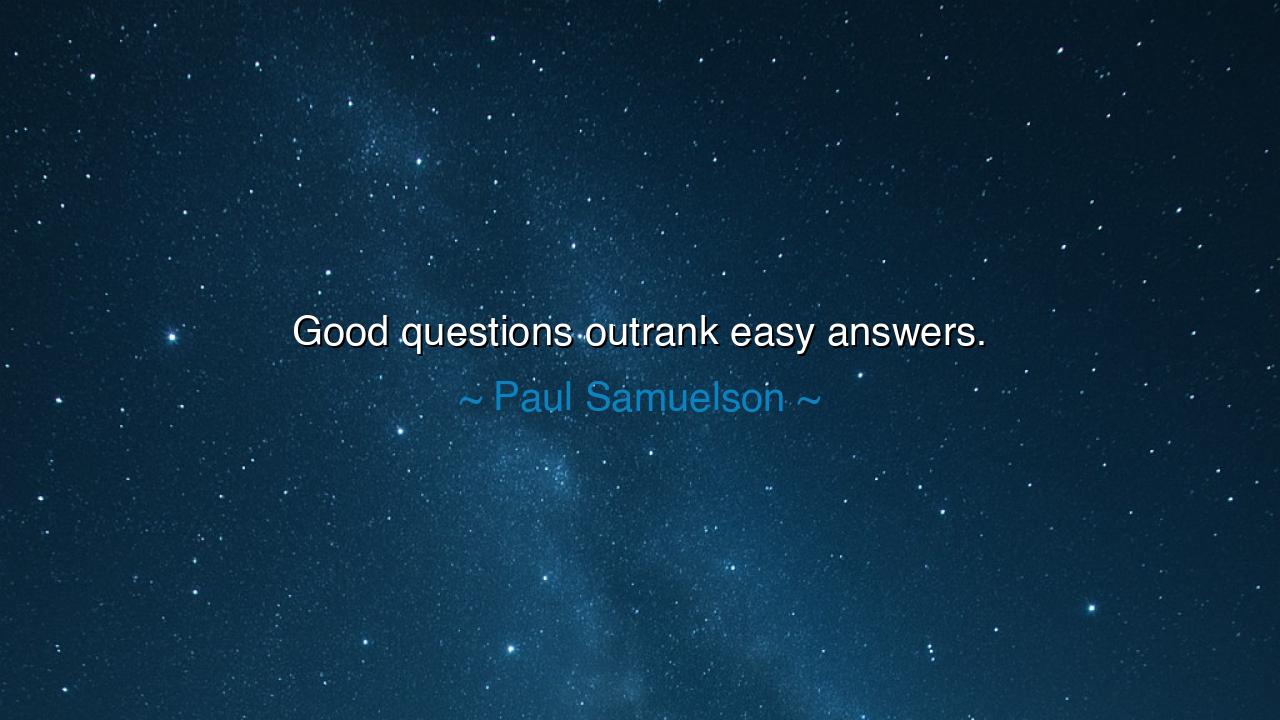
Good questions outrank easy answers.






Paul Samuelson, the great economist and teacher, once offered this truth as enduring as stone: “Good questions outrank easy answers.” In these words he teaches us that wisdom does not lie in the speed of a reply, but in the depth of inquiry. Easy answers soothe the mind like a lullaby, but they often conceal rather than reveal. Good questions, by contrast, awaken the spirit, unsettle the soul, and compel us to search for truths greater than we imagined.
The ancients knew this sacred power of questioning. Socrates, wandering the streets of Athens, asked questions that stripped away illusion and pride. His pupils clamored for answers, but he gave them questions instead. And in those questions lay his gift, for they forced men to wrestle with their own ignorance and discover truth for themselves. He proved that answers may pass away with the times, but questions endure, opening the path to deeper wisdom generation after generation.
Samuelson’s words rise not only from philosophy, but also from the world of economics, where certainty is ever elusive. In markets, in nations, in human affairs, the one who accepts easy explanations is soon deceived. But the one who asks good questions—Why does this market rise? What hidden forces shape this trend? Who benefits, and who suffers?—that one finds insights that guide nations and shape futures. To ask bravely is to see beyond appearances, to grasp the roots beneath the surface.
History too confirms this truth. Consider the voyages of Christopher Columbus. Many before him accepted the easy answer that the seas beyond were impassable, that the earth’s edge awaited with certain doom. Yet he asked a good question: might there not be a way west to reach the riches of the East? Though his voyage brought both discovery and destruction, the question itself changed the world forever. It was not the easy assurances of others that reshaped history, but the courage of one man to ask boldly.
But we must remember, not all questions are equal. A shallow question seeks to confirm what we already believe; a good question pierces to the heart of mystery, and often makes us uncomfortable. It is this discomfort that is sacred, for it forces us to grow. To cling to easy answers is to remain a child forever; to seek good questions is to walk the path of wisdom, though it be steep and rocky.
The lesson is clear: do not be satisfied with simple replies that flatter the ear. When you are told “this is how it is,” ask yourself, But why? But how? But what if? Train your mind not in memorizing answers, but in cultivating questions that dig deeper, that shine brighter, that endure longer than the moment. For answers may grow stale, but questions renew themselves with each new age.
Practical steps follow from this teaching. In study, in work, in life—resist the temptation to stop at the first answer that comes. Write down your questions, and pursue them. Let curiosity, not complacency, guide your days. In conversation, listen not to reply quickly, but to uncover the better question beneath the words. And when others rush to easy certainty, be the one who dares to dwell in the mystery.
So let this wisdom be passed down: good questions outrank easy answers, for questions are the wellsprings of progress, the torches that light the unknown, the seeds from which true wisdom grows. Be not afraid of questions that disturb, for they are the questions that transform. Easy answers will fade like smoke in the wind, but the one who asks the right question leaves a mark on eternity.






AAdministratorAdministrator
Welcome, honored guests. Please leave a comment, we will respond soon